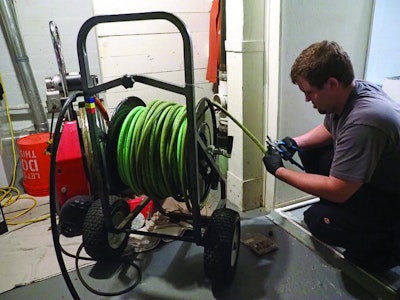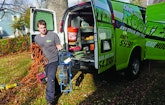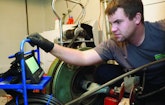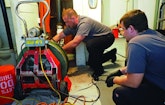
After a little over two years in business and a humble start with one person in a rented office, the owners of One Hour Rooter in the Twin Cities now find themselves near the top of their market.
Justin Stevens and Ben Theis went to school together, became plumbers together and eventually opened the business together. They knew the local market and both believed they had an opportunity to build a successful drain cleaning and inspection business.
“We had a plan which included jetting and TV inspection,” Stevens says. “When we started, we leased an office with one bay and a three-car garage. We paid cash for all our equipment and vehicles as we did not want a big ‘overhead monster’ to deal with. There are pros and cons to that type of operation, but it is how we chose to proceed. When we had cash we purchased equipment. We didn’t pay ourselves a lot of money. We put cash back into the business.”
By mid-2014 they had nine employees, six technicians and six colorful green service vans on the road.
Plan of action
The duo first spread the word about One Hour Rooter through online marketing, but that wasn’t quite enough. They networked with some larger plumbing companies that wanted their drain cleaning services and were able to put together a referral program and start subcontracting. The company always uses their own pricing and billing, however, and their logo appears on all equipment. Nevertheless, they aren’t out to steal customers and are careful not to undercut anyone. “No bait and switch,” says Stevens.
“These associations for us were crucial in the beginning. We were having to figure out what marketing worked for us. We did a lot of direct mail, ran ads in different magazines — all kinds of guerrilla marketing — parking our trucks in obvious places, driving in parades.”
One Hour Rooter was soon well enough established that they were no longer relying on subcontracting. Stevens estimates it’s just 1 to 2 percent of total sales today.
“I would look at our success as a mix between professionalism both in the office, in the field and with our technicians,” Stevens says. “We train once a week; we are a small company with big company systems, and that comes from our varied experience. We urge our technicians to be personable, from how they present themselves at the customer’s door, putting on shoe covers, to informing the customer every step of the way, reviewing our pricing and getting the job done. We want people to communicate and to have respect for the property and the person they are serving.
“We are almost a completely paperless operation,” he continues. “Everything is tracked. All invoicing is set in place and we can access everything remotely. I can be in Arizona and pull up a customer invoice on my cellphone. We track everything, from marketing, to calls, average sales per call. We designed all our systems in-house.
“We know we are on the right track as we are averaging 15 to 20 service calls a day; we have repeat customers. If a business owner or homeowner is unhappy, we give them back their money. Our office help is great with customers. We give a call back after every service call.”
One Hour Rooter is a 24/7 operation. Their customer base is 75 percent residential and 25 percent light commercial, the latter being made up primarily of restaurants and strip malls. Stevens says they would be happy to see the commercial side expand but there are some differences between the two. Sometimes payment may be a little slower with commercial customers whereas the homeowner is quick to pay the bill.
“For us the residential side is less stressful,” he says. “There is a lot of satisfaction in helping out a resident. There is a lot of room for us to grow on the residential as well as commercial side of things.”
Tools and technicians
To facilitate continued growth the company added services, but rather than jump into pipe lining or bursting they took a different route. Realizing that many customers search for a plumbing company when minor stoppages occur, they expanded to include some plumbing services to attract those customers.
There are no plans to handle sewer replacements or rehabilitation, but long-term plans include pumping services and eventually some municipal work for smaller utilities.
Drain cleaning remains the company’s core focus, and their biggest weapon in the fight against clogged lines is a MyTana MV80 jetter (8 gpm/4,000 psi) mounted in a Chevrolet Express full-size van. They also use drain cleaning machines from Spartan Tool, along with eCAM-ACE cameras from Electric Eel and RIDGID Navitrak Scout locators.
Stevens estimates that a fully equipped service van will carry close to $10,000 worth of equipment.
Technicians, who take their vans home at the end of the day, take pride in their wheels and their appearance. Uniforms are furnished but the individual is responsible for daily care. Each driver has a car wash pass, so vehicles always look good.
Finding the right technician is a challenge, Theis says. Before settling on a candidate they will interview several, and then it takes a couple months to actually see if the new hire is a good fit. New employees ride along with a technician until all procedures are thoroughly understood, and the company pays a training wage until the technician is up to speed.
Theis tries to share his knowledge with the technicians when there is an equipment failure or issue so that if they are in the field and there is a problem, the technician will have some hands-on experience and can possibly solve the problem there on the spot.
“We want the technicians to realize there are different situations out on the job and be able to adjust to the circumstances,” Theis says. “Some things do not have meaning until you have the actual experience or know to anticipate a challenge. In some cases, I may need to caution about providing better care of an expensive piece of equipment.”
He says that each morning they review the jobs for the day and decide where they are likely to need a camera and where the jet-mounted van will be going.
“We use the jetter several times each day,” Theis says. “We can be pretty flexible with this and can get to a job when needed.
“At our meeting each morning we make sure everyone is on the same page. Then at our Tuesday morning meeting we address all the safety issues, sales or other concerns the techs may have. It’s important for us to listen to people, and we try to give them what they want.”
In 2013 and 2014, as a special event and reward, One Hour Rooter took calls for a two-hour morning period on a Thursday and then the entire crew went by bus to see the Minnesota Twins play at Target Field. The following Friday was also a day off.
“As owners we have a lot of behind-the-scenes responsibilities,” Theis says. “Sometimes you just need to shut down and go see your kids. Get away. We also enjoy giving the employees this little break as well.”
And they grew
Theis describes himself as the more mechanical of the two, which Stevens says creates a perfect balance.
“I would say my management style is probably a little more intense than Ben’s,” Stevens says. “Our employees sometimes find him easier to talk with. But that depends on what’s going on, and we have worked together for so long we more or less know the dynamics and it makes things hum along pretty well. Neither of us could run this company on our own and enjoy the success we are seeing.”
He says they have put all their energy into building the customer base and following the business plan.
Stevens notes opening their own business didn’t bring any big surprises because they had seen so much in their previous jobs. They knew what to expect.
“The greatest reward on a daily basis is watching this company grow,” Stevens says. “Seeing our equipment on the road and our employees. Knowing these people are counting on us for their job. I like that we have been successful. That really makes me feel good.”









